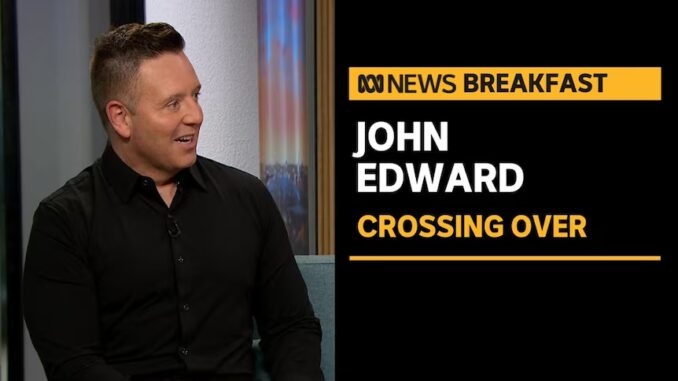
For more than three decades, John Edward has been one of the most recognizable — and controversial — psychic mediums in the world. From his hit television show Crossing Over with John Edward in the early 2000s to countless tours, lectures, and bestselling books, Edward has built a career on his claim to bridge the gap between the living and the dead. Now, with his newest book, he takes readers into one of the most unexpected chapters of his journey: moments when the FBI turned to him for insight.
A Surprising Revelation
Edward’s latest work doesn’t just revisit his television fame or the deeply emotional readings that made him a household name. Instead, it reveals how, on several occasions, law enforcement agencies — including the FBI — approached him during difficult investigations.
While Edward avoids specifics that could compromise confidentiality, he recalls cases where traditional methods had reached a dead end, and investigators sought a fresh perspective. His role was never official, but rather as an intuitive sounding board, offering impressions and visions that might shift the way professionals looked at a case.
“I’ve always made it clear,” Edward writes, “that I’m not here to crack a case or replace the hard work of law enforcement. What I can do is offer what I see, hear, or feel — and sometimes, that nudge helps redirect the focus or open a new avenue of thought.”
Psychic Intuition Meets Federal Investigation
The idea of the FBI consulting a psychic medium might sound like the plot of a TV drama, but Edward insists that these interactions were real, albeit rare. He describes them as delicate exchanges: law enforcement remained skeptical, but in moments of desperation, some were willing to explore any possible lead.
This revelation puts Edward in a long, complicated lineage of psychics who claim to have assisted criminal investigations. In popular culture, shows like Medium and The Dead Files have dramatized the concept. In reality, however, such collaborations are often kept under wraps, with agencies hesitant to admit to them for fear of undermining credibility.
Walking the Line Between Belief and Skepticism
Edward’s book arrives in a cultural moment where public interest in the paranormal remains high, but so does skepticism. For believers, his stories with the FBI feel like powerful validation of psychic ability. For critics, they highlight the dangers of mixing intuition with evidence-based investigation.
Organizations like the FBI rarely acknowledge such collaborations publicly. Skeptics argue that psychic input can waste resources or distract from factual leads. Yet Edward’s book is less about proving his legitimacy and more about sharing the personal toll of being asked to help in moments of life-or-death urgency.
He admits the responsibility weighed heavily: “When you sit with an agent and they show you a photograph, and they’re hoping you’ll see something they don’t — it’s not entertainment. It’s a reminder that behind every case file is a family desperate for answers.”
Beyond the FBI
While the FBI angle is the headline revelation, Edward’s book also covers his broader life’s work. He reflects on the pressures of fame, the emotional intensity of reading for grieving families, and the ongoing skepticism that follows him everywhere. Fans will find behind-the-scenes anecdotes from Crossing Over, while newcomers may be surprised by his candid reflections on doubt and vulnerability.
He also opens up about how his gift has shaped his personal life — the strain it placed on relationships, the skepticism he faced even from loved ones, and the balance he’s had to strike between being a performer and a deeply empathetic counselor.
A Controversial Yet Unmissable Release
Already, the publishing world is buzzing. Supporters are calling the book Edward’s most revealing yet, while critics question whether the FBI element is an attempt at sensationalism. Either way, the memoir ensures Edward remains at the center of conversation.
For fans, the book offers more than stories about psychic readings — it’s a meditation on trust, intuition, and the often-blurred line between the known and the unknown. For doubters, it’s bound to reignite debate over whether figures like Edward should ever be involved in criminal investigations.
One thing is certain: John Edward has once again managed to do what he has throughout his career — spark fascination, controversy, and conversation in equal measure.